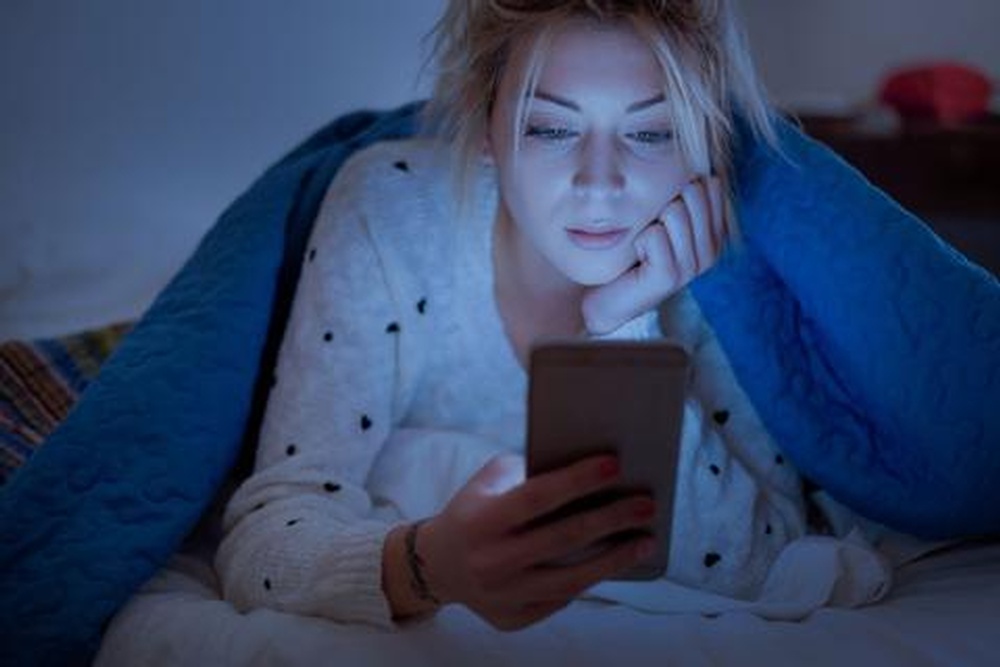Is Blue Light Bad For You?

There has been a lot of buzz around blue light. We actually wrote about the health effects of blue light all the way back in 2015. At that time, research on the subject was really just beginning in earnest. Now, as more studies have been done and we’ve become even more immersed in major sources of blue light like digital devices, we felt like it was time to revisit the topic.
WHAT IS BLUE LIGHT?
First things first, what is blue light? Any time we walk outside or turn on the lights, we’re exposed to a whole bunch of different visible light rays, as well as some invisible. For example, the sun contains the light we can see as well as those invisible ultraviolet rays responsible for sunburn. Depending on the wavelength and energy, the light comes in different colors. The visible light spectrum ranges from red on one end to blue on the other. About one-third of this visible light is blue light, technically called high-energy visible (HEV) light. It’s everywhere and the sun is the biggest source of it. The other major source is artificial lighting, particularly from energy-efficient lighting, such as LED and compact fluorescent lights, and electronic screens.
Even among blue light, there is variation. Exposure to blue-turquoise light during daylight hours is beneficial. It boosts your mood and cognitive performance, increases alertness, and helps with memory. It’s also essential for regulating our sleep-wake cycle. On the other hand, there is a blue-violet light. This is the blue light that can be harmful to the outer retina and cause a host of problems, which we’ll get to.
WHAT ARE THE NEGATIVE EFFECTS OF BLUE LIGHT?
Yes, you do want exposure to healthy blue light during the day. However, exposure to blue-violet light or excessive blue light exposure at night is what causes issues. While our electronic devices account for a much smaller percentage of our blue light exposure than the sun, there is a concern because they give off blue-violet light and we often hold them close to our eyes. Too much exposure to blue light from artificial sources can have the following negative impact on our health:
Causes Eye Strain – The blue light from your computer, cell phone, or tablet is notorious for causing digital eye strain. Eye strain can in turn lead to difficulty focusing, dry eyes, irritation, fatigue, headaches, and more.
May Lead to Retina Damage – Over time, exposure to blue light may cause retinal cell death, which, just as it sounds, is not good at all. Our eyes aren’t able to filter out blue light effectively and we wouldn’t want them to since some blue light is necessary for good health. Almost all of the blue light we’re exposed to passes through the cornea and lens and reaches the retina. When it damages the cells in the retina, it can interfere with our eyesight and lead to issues like age-related macular degeneration, which is the leading cause of permanent, severe vision loss in people over the age of 60.
Interferes With our Natural Circadian Rhythm – For most of history, at night, humans didn’t have much light. Darkness indicated to our body that it was time to wind down and go to sleep. These days, we’re surrounded by light all of the time. At night, we switch on the lights, our televisions go on and we scroll through social media on our phone. Exposure to any light after sundown can suppress the secretion of melatonin. However, exposure to blue light suppresses it for nearly twice as long. This throws off your natural circadian rhythm, or sleep-wake cycle, leading to insomnia and poor quality sleep.
Indirectly Tied to Weight Gain, Depression, Heart Disease, and Cancer – While research is still being done, there is burgeoning evidence that excessive exposure to blue light, especially from certain LED lights, could be indirectly tied to weight gain, depression, heart disease, and cancer. This is actually related to the way it interferes with our circadian rhythm and the health problems could potentially be due to lower melatonin levels. Before you panic, know that research is preliminary. It’s still worth noting though and some experts think we should start taking action now.
HOW CAN I PROTECT MYSELF FROM BLUE LIGHT?
First, switching off the lights and any devices a few hours before bedtime can have a really positive impact on your sleep and health. Beyond that, we’ve seen some amazing blue light blocking lenses come onto the market. At The Spectacle Shoppe, we’re excited about the Essilor Blue Collection. These lenses, which we offer at our Vancouver eyewear store, feature the latest in blue light technology and are designed to protect your eyes from its negative effects. They filter out the harmful blue-violet light but allow the good blue-turquoise light through. If you’re worried about aesthetics, have no fear because the lenses are clear and look just like conventional eyeglass lenses. The company’s Crizal® lens coatings are also amazing for blocking out harmful blue light. Blue light blocking lenses and coatings work for kids, teens, and adults. You can also use them on non-prescription glasses if you don’t need vision correction. In fact, computer glasses have become more popular as people aim to decrease digital eye strain.
If you’re interested in protecting your eyes with blue light blocking lenses, visit the Spectacle Shoppe in Kerrisdale today. We’ll chat with you and help you choose the best lenses for your needs and the perfect frames to go with them!